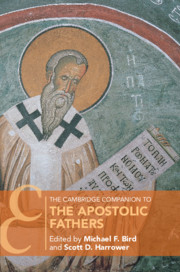Book contents
- The Cambridge Companion to the Apostolic Fathers
- Cambridge Companions to Religion
- The Cambridge Companion to the Apostolic Fathers
- Copyright page
- Contents
- Contributors
- Abbreviations
- Introduction Intriguing and Enigmatic
- 1 The Roman Empire in the Era of the Apostolic Fathers
- 2 The Image of Jews and Judaism in the Apostolic Fathers
- 3 Second-Century Diversity
- 4 The Jesus Tradition in the Apostolic Fathers
- 5 The Text of the New Testament in the Apostolic Fathers
- 6 The Reception of Paul, Peter, and James in the Apostolic Fathers
- 7 Between Ekklēsia and State
- 8 Church, Church Ministry, and Church Order
- 9 The Apostolic Mothers
- 10 1 and 2 Clement
- 11 The Letters of Ignatius
- 12 Polycarp’s Epistle to the Philippians and the Martyrdom of Polycarp
- 13 Didache
- 14 The Epistle of Barnabas
- 15 The Shepherd of Hermas as Early Christian Apocalypse
- 16 The Epistle to Diognetus and the Fragment of Quadratus
- 17 The Fragments of Papias
- Sources Index
- Subject Index
- Cambridge Companions to Religion (continued from page )
- References
4 - The Jesus Tradition in the Apostolic Fathers
Published online by Cambridge University Press: 28 May 2021
- The Cambridge Companion to the Apostolic Fathers
- Cambridge Companions to Religion
- The Cambridge Companion to the Apostolic Fathers
- Copyright page
- Contents
- Contributors
- Abbreviations
- Introduction Intriguing and Enigmatic
- 1 The Roman Empire in the Era of the Apostolic Fathers
- 2 The Image of Jews and Judaism in the Apostolic Fathers
- 3 Second-Century Diversity
- 4 The Jesus Tradition in the Apostolic Fathers
- 5 The Text of the New Testament in the Apostolic Fathers
- 6 The Reception of Paul, Peter, and James in the Apostolic Fathers
- 7 Between Ekklēsia and State
- 8 Church, Church Ministry, and Church Order
- 9 The Apostolic Mothers
- 10 1 and 2 Clement
- 11 The Letters of Ignatius
- 12 Polycarp’s Epistle to the Philippians and the Martyrdom of Polycarp
- 13 Didache
- 14 The Epistle of Barnabas
- 15 The Shepherd of Hermas as Early Christian Apocalypse
- 16 The Epistle to Diognetus and the Fragment of Quadratus
- 17 The Fragments of Papias
- Sources Index
- Subject Index
- Cambridge Companions to Religion (continued from page )
- References
Summary
This essay will analyze the Jesus tradition in the Apostolic Fathers in light of recent debates on the relationship between orality and textuality in antiquity. Specifically, it will analyze the Jesus tradition in the Apostolic Fathers as oral tradition, given that it almost certainly derived from an oral-traditional source. This approach reflects a scholarly paradigm-shift that has been gaining momentum over the last three decades in studying the interplay of orality and textuality in early Christian circles. Prior to this paradigm-shift one could say with Werner H. Kelber that historical biblical scholarship was “empowered by an inadequate theory of the art of communication in the ancient world.” The paradigm-shift involves taking seriously that early Christianity arose and spread within societies that were predominantly oral. Not that attention to oral tradition is something new; New Testament scholars appealed to it for centuries, for example, in debating the sources and historical reliability of the canonical Gospels. Relatively recent, however, are the many insights into the inner workings of oral tradition in antiquity provided by a newer generation of scholars, many of whom built upon the pioneering work of Milman Parry and Albert Lord. These new insights are reshaping our understanding of the role of oral Jesus tradition in the early Christian community, and causing us to rethink the impact of orality and textuality upon early Christian writings and their sources.
- Type
- Chapter
- Information
- The Cambridge Companion to the Apostolic Fathers , pp. 73 - 91Publisher: Cambridge University PressPrint publication year: 2021

